I didn’t go outside the next morning. I just sat in the recliner and stared at that ball like it held every good part of me I’d tried to bury.
Funny thing about memory — it shows up when you least expect it, dragging its feet like a kid late to practice. One minute, you’re sipping cold coffee, and the next, you’re back on the diamond, your voice hoarse from shouting, “Cut off, second! Cut off, second!”
I didn’t cry.
Not until I opened the old cedar chest under the bed.
It hadn’t been touched in years. Dust covered the lid like a warning sign: Here lies the man you used to be. But the hinges still creaked the same. Inside, under a folded hoodie that said “Hawkeyes Baseball 2002,” were scorebooks, photos, letters kids had written me after graduation.
I ran my hand across the pages, as if touching them would bring back the smell of sweat and dirt, the thud of a glove catching fastball. Some of the notes were misspelled. Some were illegible. But one from 1999 stood out:
“Coach Harwell, thanks for seeing the best in me, even when I couldn’t. You’re the reason I stayed in school. Love, Eli.”
Eli. The lefty who struck out every time for two years and then hit a triple on the last day of eighth grade. I remembered the way he cried on third base. I remembered the way I hugged him like he was my own.
I thought I had nothing left to give. But these boys — they still carried me.
That afternoon, I cleaned up. Shaved. Changed out of the flannel I’d worn three days straight. Packed the ball into a satchel, along with the old glove.
Then I called a cab.
“Where to?” the driver asked.
“McKinley Middle School,” I said.
He gave me a look in the rearview mirror. “That place still open?”
“Barely,” I said.
The field hadn’t changed much. The paint was fading from the dugouts, the benches were cracked, and the outfield fence was now more rust than chain-link. But it still stood.
It was late. No kids around. Just the breeze rolling through the grass like an old friend whispering hello.
I shuffled to the mound. My stump ached, but I didn’t care. I bent down — slow and deliberate — and placed the signed ball on the pitcher’s rubber. Then I whispered, “Still yours, boys.”
That night, I slept like I hadn’t in years.
A week passed. Then two.
I wasn’t expecting anything. I’d made my peace.
Then came the second knock.
This time it was a boy. Maybe eleven. String bean arms, crooked cap, holding a plastic bat like it meant something.
“You Coach Harwell?”
I blinked. “Used to be.”
“My dad says you were the best. Said you’d teach us if we asked.”
I looked past him. Five more kids stood near the old bleachers. No uniforms. No gloves. Just sneakers and hope.
“Who’s your dad?” I asked.
“Julio. Julio Reyes.”
I laughed. “Backwards cap. Curveball that never curved?”
The boy grinned. “He said you made him believe he could throw heat.”
I looked down at my hands. “I don’t have a whistle anymore.”
“You don’t need one,” the boy said.
I nodded. “Alright. First thing’s first — we fix that swing. You’re chopping like you’re swatting flies.”
That evening, we ran drills till the sun dipped behind the trees. My walker stayed near the fence, forgotten. I used a bucket for balance. My voice cracked from shouting.
It was the best I’d felt in two decades.
Word spread. More kids came. Some parents too. I wasn’t a teacher. Not officially. But I became something else. A memory made real. A living echo.
Grant Richmond came home that summer.
He showed up during one of our evening practices, wearing the red, white, and blue jacket of Team USA. The kids went wild.
“Coach,” he said, walking up with tears in his eyes, “I kept that glove you gave me.”
I clapped his shoulder. “And you made it count.”
“I wouldn’t have made it without you.”
“You made it because you kept swinging, Grant.”
He reached into his duffel and handed me a jersey. It was stitched with my name. Number 42. The number I always wore.
“Hall of Fame’s doing a special on influential coaches. They want to hear about the ones who start the fire — not just the ones who fan the flame.”
I didn’t know what to say. My throat locked up.
We stood there in the golden hour, the kids practicing behind us, the field alive again.
I glanced around. “You know, this used to be where we taped up broken cleats and ran drills in the mud.”
“It still is, Coach,” he said. “Because you’re still here.”


